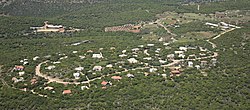Abirim
Abirim אַבִּירִים | |
|---|---|
 | |
| Etymology: Knights | |
| Coordinates: 33°2′22″N 35°17′15″E / 33.03944°N 35.28750°E | |
| Country | |
| District | Northern |
| Council | Ma'ale Yosef |
| Founded | 1980 |
| Population (2022)[1] | 310 |
| Website | abirim.info |

Abirim (Hebrew: אַבִּירִים, lit. 'Knights'), also known as Mitzpe Abirim, is a community settlement in northern Israel. Located in the Upper Galilee, three kilometres from Ma'alot-Tarshiha, it falls under the jurisdiction of Ma'ale Yosef Regional Council. In 2022 it had a population of 310.[1] It is located in the middle of a natural oak forest bordering the Nahal Kziv nature reserve.
History
Abirim was established in 1980 on land that had belonged to Fassuta prior to 1948.[2] It was initially named "Eder" and then renamed to "Abirim" after the nearby ruins of Burj Misr (Arabic: "Egyptian Tower"), which was renamed to Horbat Metsad Abirim (Hebrew: "Ruin of the Fortress of the Knights") in 1957.[3][4] The age and original purpose of the ruins is unknown; proposals range from a Crusader stronghold to a mausoleum from the Hellenistic period (4th–3rd centuries BCE).[5][6]
See also
References
- ^ a b "Regional Statistics". Israel Central Bureau of Statistics. Retrieved 21 March 2024.
- ^ Survey of Palestine, Map sheet 17-27 Tarbikha, 1:20,000, 1948.
- ^ Khalidi, Walid, ed. (1992). All that remains: the Palestinian villages occupied and depopulated by Israel in 1948. Washington, D.C: Institute for Palestine Studies. pp. 12–13. ISBN 978-0-88728-224-9.
- ^ Government of Israel, ילקוט הפרסומים (Gazette) number 536, 14 May 1957, p. 856.
- ^ Asher Ovadieh; Yinon Shivtiel (2016). "The caves in the cliff shelters of Keziv Stream (Nahal Keziv) and the relief of 'The Man in the Wall'". Liber Annuus. 66: 351–375. doi:10.1484/J.LA.4.2018015.
- ^ Denys Pringle (1997). Secular Buildings in the Crusader Kingdom of Jerusalem. Cambridge University Press. p. 43.


